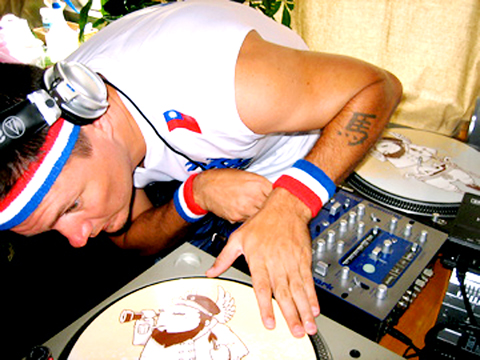“To say I’m happy to be back [in Taipei] would be a colossal understatement,” says Marcus Aurelius, on returning from an eight-month sojourn in Shanghai.
Known to many as a trailblazer in the hip-hop scene here in Taiwan, Aurelius lived in Taipei for 10 years before moving to China’s largest city in September to take up a residency at Volar and play gigs at underground spot Shelter and top nightclub Attica.
A former Vinyl Word writer, Aurelius, 33, is a deejay married to hip-hop, funk and soul, though he’s been known to dabble in dub, dancehall and reggae.

PHOTO COURTESY OF MARCUS AURELIUS
He uses the MP3 mixer Serato, a laptop and turntables, which allow him the freedom to mix quickly with up to four tracks on the go at once.
With rapid changeover mixes, Aurelius rarely plays full tracks, which is a style of deejaying born of the Serato. Though some purists are not keen on this form of mixing, preferring to hear longer tracks, Aurelius says, “in a two or three-hour set I can blaze through 200 to 300 songs. We live in a world where people watch TV and work on their laptops with three windows open while at the same time they are chatting to two friends on MSN and playing online poker. My deejay sets reflect this brave new world of overabundance.”
While living in Taipei, Aurlieus had played several gigs in China, and was all set to take the PRC by storm as tourists flooded in for the Olympic.
So why return to Taiwan? “The main reason was visa issues,” says Aurelius. “In China they cracked down on the visas hard. Now every freelancer [artist/DJ/MC/writer] has either left the country or traded in their Doc Martins for teaching shoes because they needed a work visa.”
Digging a little deeper, another reason is discernable. “From the outside, China seems like a tightly controlled country. On the inside, however, there is actually no law,” says Aurelius. “No, that’s not true. There is one law there … ‘get yours’ and not give a ‘funk’ about anyone or anything.”
Aurelius is critical of the prevailing attitudes to performers in China and the reception given to artists, especially musicians. “Beyonce’s DJ
is playing tonight? Someone will hate it because it’s too commercial. Nu-Mark from Jurassic Five will be playing at an underground venue? Nah … they don’t have bottle service there,” says Aurelius.
“On my final day in Shanghai, I wanted to watch the sun go down from my apartment. I could only see a small orange dot over the horizon of construction and smog. Taipei gives me shades of pink, purple and orange burning through the sky.”
“Sometimes you have to leave to know how good we all have it here,” he says of Taipei. “Taiwan’s music scene is always growing. There is a lot of room for different acts. Everyone has their own little circles and we intertwine in various ways.”
Read next week’s Around Town section for news on Aurelius’ upcoming gigs and former Taipei resident Trix, who now lives in Shanghai but is returning for a gig.
ON THE NET: www.myspace.com/djmarcusa

When nature calls, Masana Izawa has followed the same routine for more than 50 years: heading out to the woods in Japan, dropping his pants and doing as bears do. “We survive by eating other living things. But you can give faeces back to nature so that organisms in the soil can decompose them,” the 74-year-old said. “This means you are giving life back. What could be a more sublime act?” “Fundo-shi” (“poop-soil master”) Izawa is something of a celebrity in Japan, publishing books, delivering lectures and appearing in a documentary. People flock to his “Poopland” and centuries-old wooden “Fundo-an” (“poop-soil house”) in

Jan 13 to Jan 19 Yang Jen-huang (楊仁煌) recalls being slapped by his father when he asked about their Sakizaya heritage, telling him to never mention it otherwise they’ll be killed. “Only then did I start learning about the Karewan Incident,” he tells Mayaw Kilang in “The social culture and ethnic identification of the Sakizaya” (撒奇萊雅族的社會文化與民族認定). “Many of our elders are reluctant to call themselves Sakizaya, and are accustomed to living in Amis (Pangcah) society. Therefore, it’s up to the younger generation to push for official recognition, because there’s still a taboo with the older people.” Although the Sakizaya became Taiwan’s 13th

Earlier this month, a Hong Kong ship, Shunxin-39, was identified as the ship that had cut telecom cables on the seabed north of Keelung. The ship, owned out of Hong Kong and variously described as registered in Cameroon (as Shunxin-39) and Tanzania (as Xinshun-39), was originally People’s Republic of China (PRC)-flagged, but changed registries in 2024, according to Maritime Executive magazine. The Financial Times published tracking data for the ship showing it crossing a number of undersea cables off northern Taiwan over the course of several days. The intent was clear. Shunxin-39, which according to the Taiwan Coast Guard was crewed

For anyone on board the train looking out the window, it must have been a strange sight. The same foreigner stood outside waving at them four different times within ten minutes, three times on the left and once on the right, his face getting redder and sweatier each time. At this unique location, it’s actually possible to beat the train up the mountain on foot, though only with extreme effort. For the average hiker, the Dulishan Trail is still a great place to get some exercise and see the train — at least once — as it makes its way